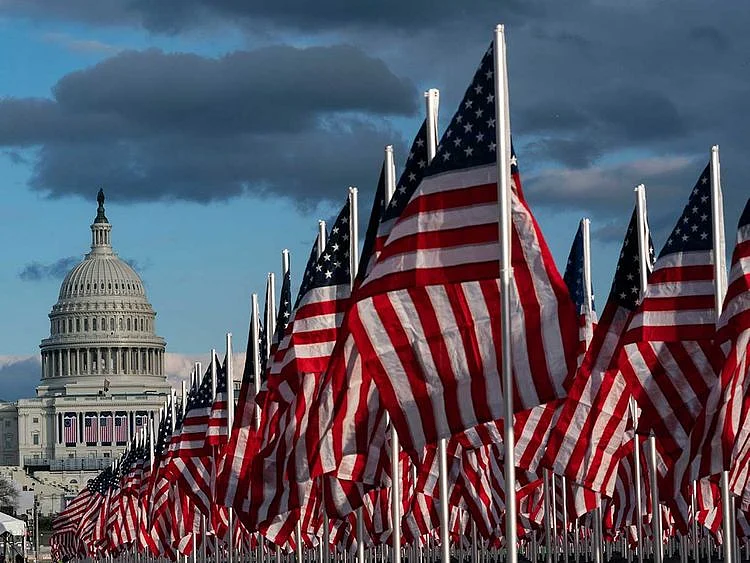“Mirror, mirror on the Wall, who is the Strongest of them all?”
“You, O’ America … for now!”
(Inspired by the Snow White tale)
Although its image was walloped in recent years, as its grip on world affairs weakened and it appeared indecisive about maintaining what is described as the rules-based international order, the US is still looked upon by its allies and friends for it leadership to maintain the world order as we have known it.
Doubts have been frequently voiced over Washington’s willingness to continue to play the leadership role in a world, undermining the interests of the much-quoted but barely understood free world, a term that crept into the West’s political vocabulary after World War II and has since then become rather fashionable — nay, an indispensable staple of political diet — to use it with the progression of time.
It encompasses political freedom manifested in democratic values and ideals in the form of free and fair elections, freedom of speech, freedom to practice religion, etc. However, politicians, scholars and their ilk also use it to include economic freedom, with emphasis on free market economy, freedom of navigation, (which also overlaps security issues), etc.
America’s dominance
Promoting the economic interests of the free world may not have been the main agenda driving America’s dominance in world affairs. Indeed, the US, unlike Europeans and other allies, who many times place economic interests above politics while dealing with rest of the world, maintained a presence in both Europe and Asia in a bid, mainly, to hedge against any threats from these regions although the US also reaped economic benefits from this presence.
After the Cold War, the US continued to defend Europe and its allies even though the nemesis, the Soviet Union, had dissolved itself; the new avatar Russia seemed to move towards greater freedom and democratisation.
The Europeans, feeling that the communist Soviet threat was gone forever, began intensifying their ties with the former member states of the Soviet Empire. Indeed, some European nations, foremost of them Germany, invested in a long-term supply of oil and gas and other commodities from Russia.
But the Americans closely monitored Russia’s dealing with its former republics or the member states of its defunct Warsaw Pact alliance. Indeed, the Americans stationed some troops in Poland and Romania.
The US retained its footprint not only in Europe but also in Asia in the post-Cold War period. With an eye on the growing military power of China, the US has forged close defence cooperation with Japan, South Korea, Taiwan, Singapore and Australia while it maintains strategic partnerships with Indonesia, Vietnam and India which have their own concerns about China.
Despite the huge distraction created by Russia’s invasion of Ukraine, the US and its allies are also keeping a close eye on China which has stepped into a stronger global role on climate change, besides its focus on the Belt-Road Initiative.
West’s strategy
The China factor weighs heavily in the West’s strategy after some earlier deviations. The Presidency of Donald Trump proved to be an interruption in America’s leadership role. In the early part of his Presidency, Trump withdrew from the Trans-Pacific Partnership which his predecessor, Barack Obama, had conceived as a pivot to Asia.
Even under the Presidency of his successor Joe Biden, there has been no attempt to return to the partnership which now, under Japan’s stewardship, is called Comprehensive and Progressive Agreement for Trans Pacific Partnership (CPTPP). America’s allies were aghast and asking if America had abandoned its leadership role.
Trump’s “America first” foreign policy moved away from multilateral arrangements in trade, economic diplomacy or security. He had sowed the seed of discord among European allies, using acerbic language against some European leaders. The optics of the glum faces of Trump, the former German Chancellor Angela Merkel and the French President Emmanuel Macron mirrored the sharp differences among the participants at the G-7 summit in Canada on June 9, 2018.
This had a devastating impact on the morale of European allies who felt disappointed by the attitude of the Trump administration which had publicly called on Europeans to pay more for American efforts to defend them. The US, to quote Trump, was not a “piggy bank”.
America’s shaky image received a further setback with the arrival of the deadly virus Covid-19.
Multilateralism took a back seat during Trump’s Presidency as he frequently criticised the UN system and the World Health Organisation.
While Trump’s successor Joe Biden started his Presidency by reaching out to the allies and mending fences with them, his messy withdrawal from Afghanistan made America look like a weakling incapable of donning the world leadership role.
While the US will continue to be the world’s leading force, with an uncontested level of economic development and a top position in science, medicine, technology and innovations, it will need to respect the limitations and existential choices open to others, if it wants to earn the goodwill of friends and allies.
President Biden who has tried to mend fences with European allies, needs to build on the thaw to ensure a smooth and mutually beneficial cooperation with the allies.
The free world, on its part, realises that it has no choice but to rely on American leadership, even though the world has, apparently, acquired a multipolar character. Recent events such as Russia’s Ukraine attack will keep the US-European alliance intact. However, the US will have to work hard to actively prop up the alliance and regain its leadership role.
Manik Mehta is a New York based journalist who writes extensively on foreign affairs/diplomacy, United Nations, US bilateral relations and global economics
Sign up for the Daily Briefing
Get the latest news and updates straight to your inbox
Network Links
GN StoreDownload our app
© Al Nisr Publishing LLC 2025. All rights reserved.
